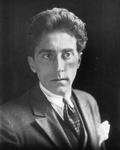Biography

Jean Cocteau was born in the vicinity of Paris, France, in Maisons-Lafitte on July 5, 1889. He did however, grow up in Paris, with his rich bourgeois family. Due to the social and economic placement of his family, Cocteau was able to reap the rewards of the privileges of the high class. This included being exposed to theater and arts at not only a young age, but being able to be constantly surrounded by it. At the age of sixteen, he was already a published poet. When his first volume of poems were read in public by an actor, Edouard De Max, Cocteau sensed danger of such sorts of public attention, and focused on other styles and genres. This became a habit for Cocteau throughout his life, after completing a work, he would try his hand at other genres or styles. Even as a young man, authors such as Marcel Proust were promoting and befriending Cocteau. Later, he would meet and befriend Pablo Picasso, who had a large influence on Cocteau, despite Picasso making some arrogant remarks in interviews regarding Cocteau.
When the First World War began, Cocteau was not officially enlisted, although he illegally drove an ambulance on the Belgium front, where many of his experiences were to be used in his novel Thomas l'imposteur. While the war was occurring, Cocteau continued his love of all things artistic, and associated himself with artists such as Modigliani, poet Apollinaire, poet Max Jacob, Reverdy, Andre Salmon, Blaise Cendrars, and Pablo Picasso. At the same time, he had become a mentor for a young Raymond Radiguet, who would become a famous author before he died at twenty-one. After Radiguet's death, and perhaps because of it, Cocteau developed an addiction to opium. Cocteau then spent 60 days in a sanatorium to cure the addiction, at which point philosopher Jacques Maritain came to visit him. Maritain was Catholic, and after Cocteau's release from the sanatorium he visited the house of Maritain and his wife, where a priest was present. Friendship with Maritain, and the priest, Charles Henrion, led Cocteau to a short-lived period of religious practice. However short-lived, the friendship with the two helped him cope with the loss of friend Radiguet, and to focus some of his ideas.
After this point, Cocteau would produce some of his most famous works, including his plays Orphee and Les Enfants Terribles, which later in his life would be adapted into films. It was after his first bout with Opium addiction that as he focused on his works again, turned some of his interests into film making. Cocteau's first film was Le Sang d'un Poete, or The Blood of a Poet in 1930. During the rest of the 1930s, he did not venture into film, yet at this time produced many of his popular plays, essays, and poems. One of such poems was Les Parents terribles which debuted at Le Theatre des Ambassadeurs in 1938. The play was controversial, and drew negative attention from the Conseil Municipal, who tried to stop the play. It was eventually moved to another theater, Les Bouffes-Parisiens. The play had reached 400 runs before World War II broke out, and it was not to be the last time Cocteau would receive criticism, and not even the last time for this play.
After his opium rehabilitation, Cocteau was again working quite hard, and had one interesting adventure in 1936 when Cocteau went around the world to send back articles to newspaper Paris Soir. He called the articles Tour du monde en 80 jours or Around the World in 80 Days in honor of the Jules Verne story. On this journey, he became friends with Charlie Chaplin in America. In 1937, writing for a different paper, Ce Soir and making an unlikely friend in the boxing world, Al Brown. Brown formerly held the bantam weight title, but was depressed and drinking when Cocteau saw him in a night club in Montmartre. Brown later won his title back, and credited the help and friendship of Jean Cocteau as an important factor. Cocteau later convinced Brown to join a circus as a shadowboxing dancer.
Jean Cocteau died at age 74 on October 11, 1963, and was buried at a chapel named Saint-Blaise-des-Simples, where he had painted some decorations. Before his death, Cocteau had been making sketches to paint a different chapel in Frejus, but did not live to begin to paint them in the chapel. However, he had seen artistic opportunity in a gardener he had employed for his final living space, a house in a small town named Milly-la-Foret. He had actually gone on to adopt the gardener, who previously worked in iron mines, and coached him as an artist, and the gardener, Edouard Dermit, later went on to paint the chapel.
Last updated August 30, 2011



